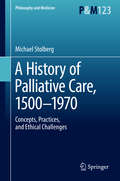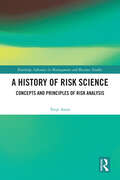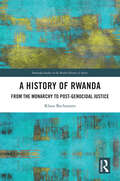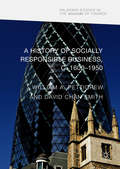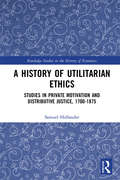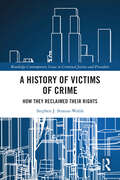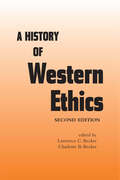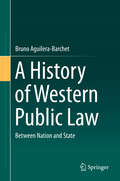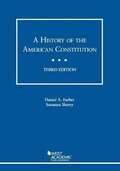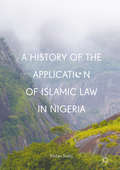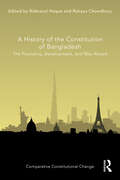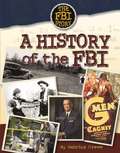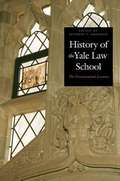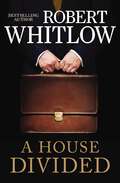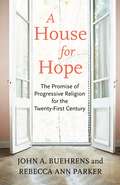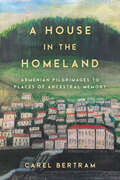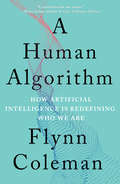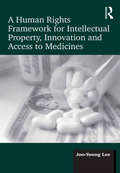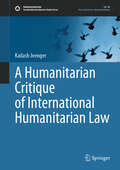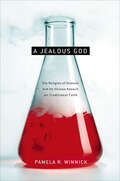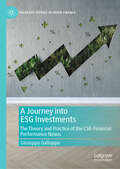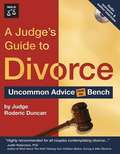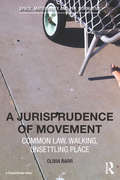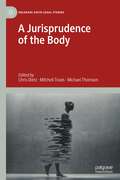- Table View
- List View
A History of Palliative Care, 1500-1970: Concepts, Practices, and Ethical challenges (Philosophy and Medicine #123)
by Michael StolbergThis book on the history of palliative care, 1500-1970 traces the historical roots of modern palliative care in Europe to the rise of the hospice movement in the 1960s. The author discusses largely forgotten premodern concepts like cura palliativa and euthanasia medica and describes, how patients and physicians experienced and dealt with terminal illness. He traces the origins of hospitals for incurable and dying patients and follows the long history of ethical debates on issues like truth-telling and the intentional shortening of the dying patients' lives and the controversies they sparked between physicians and patients. An eye opener for anyone interested in the history of ethical decision making regarding terminal care of critically ill patients.
A History of Risk Science: Concepts and Principles of Risk Analysis (Routledge Advances in Management and Business Studies)
by Terje AvenRisk has been handled as long as there have been humans on Earth. However, the risk field is a young discipline; systematic attempts to access and handle risk – explicitly conceptualizing and expressing risk – in society are a recent endeavour. This book presents a history of risk science and risk analysis highlighting concepts and principles for understanding, assessing, communicating, managing and governing risk.The author presents and discusses key contributions to risk science using a historical lens and from the perspective of a risk scientist. The book strengthens our understanding of what risk science is and how it has evolved by exploring fundamental topics such as risk characterization, risk perception, risk communication, risk handling and decision-making and concludes with reflection on the future of risk science, and in particular what we can learn from its history.A History of Risk Science will be essential reading for risk researchers and graduate students as well as scholars from associated fields applying risk-related analysis to their work.
A History of Rwanda: From the Monarchy to Post-genocidal Justice (Routledge Studies in the Modern History of Africa)
by Klaus BachmannA History of Rwanda: From the Monarchy to Post-genocidal Justice provides a complete history of Rwanda, from the precolonial abanyiginya kingdom, through the German and Belgian colonial periods and subsequent independence, and then the devastating 1994 genocide and reconstruction, right up to the modern day. Based on extensive archival research, this book provides new insights and corrects many popular stereotypes about Rwanda, aiming to go beyond the polarized and heated debates focused on the genocide and the events that followed. Readers will get a clear and broad picture of Rwanda’s history and the social and political contexts that have defined the county from the pre-colonial period onwards. Embedding Rwanda’s history in the regional context, this book avoids simple moral judgements and instead shows where and when Rwanda differed from its neighbours and how the country’s history fits into larger debates about colonialism, genocide, ethnicity, race and development. Offering a full and balanced exploration of Rwanda’s rich and paradoxical history, this book will be an important read for researchers and students of African history, genocide studies, transitional justice, colonialism, and political and social anthropology.
A History of Socially Responsible Business, c.1600–1950
by David Chan Smith William A PettigrewThis book examines the changing reciprocal relationships between corporations and their various social obligations over the very long term - from the seventeenth to the twentieth century. Chapters from emerging and established business historians assess the full range of social obligations that corporations held historically. By adopting an innovative methodological approach that is long-term and comparative, this book offers a challenge to the literature on corporate history and will be of interest to researchers and academics in the field of finance and business history.
A History of Tort Law 1900-1950
by Paul MitchellMany of the defining features of the modern law of tort can be traced to the first half of the twentieth century, but, until now, developments in that period have never received a dedicated historical examination. This book examines both common law and statutory innovations, paying special attention to underlying assumptions about the operation of society, the function of tort law, and the roles of those involved in legal changes. It recovers the legal and social contexts in which some landmark decisions were given (and which puts those decisions in a very different light) and draws attention to significant and suggestive cases that have fallen into neglect. It also explores the theoretical debates of the period about the nature of tort law, and reveals the fascinating patterns of influence and power at work behind statutory initiatives to reform the law.
A History of Utilitarian Ethics: Studies in Private Motivation and Distributive Justice, 1700-1875 (Routledge Studies in the History of Economics)
by Samuel HollanderIn this landmark volume, Samuel Hollander presents a fresh and compelling history of moral philosophy from Locke to John Stuart Mill, showing that a ‘moral sense’ can actually be considered compatible with utilitarianism. The book also explores the link between utilitarianism and distributive justice. Hollander engages in close textual exegesis of the works relating to individual authors, while never losing sight of the intellectual relationships between them. Tying together the greatest of the British moral philosophers, this volume reveals an unexpected unity of eighteenth and nineteenth century ethical doctrine at both the individual and social level. Essential reading for advanced students and researchers of the history of economic thought, political economy, history of ethics, history of political thought and intellectual history.
A History of Victims of Crime: How they Reclaimed their Rights (Routledge Contemporary Issues in Criminal Justice and Procedure)
by Stephen J. Strauss-WalshThis book examines the evolution of the contemporary crime victim’s procedural place within modern Western societies. Taking the history of the Irish crime victim as a case study, the work charts the place of victims within criminal justice over time. This evolves from the expansive latitude that they had during the eighteenth century, to their major relegation to witness and informer in the nineteenth, and back to a more contemporary recapturing of some of their previous centrality. The book also studies what this has meant for the position of suspects and offenders as well as the population more generally. Therefore, some analysis is devoted to examining its impact on an offender’s right to fair trial and social forms. It is held that the modern crime victim has transcended its position of marginality. This happened not only in law, but as the consequence of the victim’s new role as a key sociopolitical stakeholder. This work flags the importance of victim rights conferrals, and the social transformations that engendered such trends. In this way victim re-emergence is evidenced as being not just a legal change, but a consequence of several more recent sociocultural transformations in our societies. The book will be of interest to researchers, academics, and policy makers in criminal law, human rights law, criminology, and legal history.
A History of Western Ethics
by Lawrence C. Becker Charlotte B. BeckerThis newly revised and updated edition of A History of Western Ethics is a coherent and accessible overview of the most important figures and influential ideas of the history of ethics in the Western philosophical tradition.
A History of Western Public Law: Between Nation and State
by Bruno Aguilera-BarchetThe book outlines the historical development of Public Law and the state from ancient times to the modern day, offering an account of relevant events in parallel with a general historical background, establishing and explaining the relationships between political, religious, and economic events.
A History of the American Constitution
by Suzanna Sherry Daniel FarberThe third edition brings the material up-to-date with both the latest historical scholarship and the most recent Supreme Court decisions using historical analysis. Among both judges and academics, one of the hottest issues in constitutional law is the role of "original intent." Almost everyone agrees that it is important, and some scholars and judges believe it should be the most important factor in constitutional law. To think about these issues intelligently, law students need to have ready access to the historical materials so they can see how the Framers of the Constitution thought about critical issues. Yet the original source materials fill many volumes. Writings by historians also fill many bookshelves. Just as the traditional casebook selects and condenses materials from the court reports to make them useful for law students, this book does the same thing for the historical evidence of original intent. There is no other source that covers this range of materials, combined with concise overviews of the best understanding of the historical context. Only this book gives students a cogent introduction to the history behind the Constitution and its major amendments, so they can form their own judgments about the "original understanding" and its relevance to modern constitutional law.
A History of the Application of Islamic Law in Nigeria
by Yushau SodiqThis work analyzes the history of the application of Islamic law (Shari`ah) in Nigeria. It analyzes how Islamic law emerged in Nigeria toward the beginning of the 19th century and remained applicable until the arrival of the British Colonial regime in Northern Nigeria in 1903. It sheds light on how the law survived colonial rule and continues until today. Dr. Yushau Sodiq analyzes progressive elements in Islamic law over the past two centuries. He goes on to discuss many objections raised by the Nigerian Christians against the application of Islamic law, as well as how Muslims respond to such criticism. In a world that is often saturated with Islamophobia and ignorant misconceptions about Islam, this book aims to clarify and respond to many important concepts and ideas within Islamic religious tradition.
A History of the Constitution of Bangladesh: The Founding, Development, and Way Ahead (Comparative Constitutional Change)
by Ridwanul Hoque Rokeya ChowdhuryMarking the 50th anniversary of Bangladesh's Constitution, this book gauges its development from 1972 to 2022, focusing on its foundational goals, performances, and current challenges. The collection, presenting diverse but issue-specific chapters, shows how the people, political parties and leaders, and constitutional and legal institutions interact with each other in advancing, breaking, and remaking their Constitution. It examines the local context, parliamentary history, and interpretive tools adopted by the Supreme Court in understanding the Constitution as well as the future prospect of constitutional politics and practices. The work brings together legal professionals and constitutional law scholars to encapsulate the panorama of the country’s constitutional evolution. The authors look back to the history of constitution-making, to reflect critically on the present in light of the founding goals, spirits, and aspirations and with a view to offering a forward-looking and resilient vision of constitutionalism in Bangladesh. The book will be of interest to researchers, academics, and policy-makers working in the areas of comparative constitutional law and politics and South Asian Studies.
A History of the FBI
by Sabrina CreweThe Federal Bureau of Investigation (FBI) is a national agency dedicated to investigation federal crimes. Founded as a small team of special agents on July 26, 1908, the Bureau was first charged with enforcing the growing body of federal laws covering the United States as a whole. Almost from the beginning of its 100-year history, the Bureau has been the subject of legend and controversy. It has also evolved into a vast and sophisticated national law-enforcement agency. Whether as a federal crime-fighting force or a source of investigative support of local and state police forces, the modern FBI strives to embody its ideals of fidelity, bravery, and integrity. The story of the FBI is really the story of the United States as it changed through the 20th century and into the 21st. As the nation grew, both in size and wealth, the Bureau's powers grew with it. Two world wars brought new demands on the FBI to protect Americans. From the gangster era and crime networks, through political scandals and civil rights, to cyber-crime and terrorism-this book shows how the FBI has played a role in U.S. history for 100 colorful years.
A History of the Yale Law School: The Tercentennial Lectures
by Anthony T. KronmanA fascinating examination of the history of the Yale Law School and its impact on the development of legal education in the U. S. The entity that became the Yale Law School started life early in the nineteenth century as a proprietary school, operated as a sideline by a couple of New Haven lawyers. The New Haven school affiliated with Yale in the 1820s, but it remained so frail that in 1845 and again in 1869 the University seriously considered closing it down. From these humble origins, the Yale Law School went on to become the most influential of American law schools. In the later nineteenth century the School instigated the multidisciplinary approach to law that has subsequently won nearly universal acceptance. In the 1930s the Yale Law School became the center of the jurisprudential movement known as legal realism, which has ever since shaped American law. In the second half of the twentieth century Yale brought the study of constitutional and international law to prominence, overcoming the emphasis on private law that had dominated American law schools. By the end of the twentieth century, Yale was widely acknowledged as the nation's leading law school. The essays in this collection trace these notable developments. They originated as a lecture series convened to commemorate the tercentenary of Yale University. A distinguished group of scholars assembled to explore the history of the School from the earliest days down to modern times. This volume preserves the highly readable format of the original lectures, supported with full scholarly citations.
A House Divided
by Robert WhitlowCorbin Gage can stand up to anyone . . . But his own divided house will bring him to his knees. Corbin, a longtime legal champion for the downtrodden, is slowly drinking himself into the grave. His love for "mountain water" has cost him his marriage to the godliest woman he knows, ruined his relationship with his daughter, Roxy, and reduced the business at his small Georgia law firm to a level where he can barely keep the bill collectors at bay. But it isn't until his son, Ray, threatens to limit Corbin's time with his grandson that Corbin begins to acknowledge he might have a problem. Despite the mess that surrounds his personal life and against the advice of everyone he knows, Corbin takes on a high-stakes tort case on behalf of two boys who have contracted non-Hodgkin's lymphoma due to an alleged chemical exposure. The defendant, a fertilizer company, is the largest employer in the area. The lawsuit becomes a tornado that sucks Corbin, Ray, and Roxy into an increasingly deadly vortex. Equally intense pressure within the family threatens to destroy, once and for all, the thin threads that connect them. Corbin must find the strength to stand up to his personal demons. Justice for two dying boys depends on it . . . his family depends on it. "Fans of John Grisham will find much to like here." --Library Journal of The Confession
A House for Hope: The Promise of Progressive Religion for the Twenty-first Century
by John A. Buehrens Rebecca Ann ParkerFor over a generation, conservative religion has seemed dominant in America. But there are signs of a strengthening liberal religious movement. For it to flourish, laypeople need a sense of their theological heritage. A House for Hope lays out, in lively and engaging language, the theological house that religious liberalism has inherited--and suggests how this heritage will need to be spiritually and theologically transformed. With chapters that suggest liberal religious commitment is based on common hopes and an expansive love for life, A House for Hope shows how religious liberals have countered fundamentalists for generations, and provides progressives with a theological and spiritual foundation for the years ahead.
A House in the Homeland: Armenian Pilgrimages to Places of Ancestral Memory (Worlding the Middle East)
by Carel BertramA powerful examination of soulful journeys made to recover memory and recuperate stolen pasts in the face of unspeakable histories. Survivors of the Armenian Genocide of 1915 took refuge across the globe. Traumatized by unspeakable brutalities, the idea of returning to their homeland was unthinkable. But decades later, some children and grandchildren felt compelled to travel back, having heard stories of family wholeness in beloved homes and of cherished ancestral towns and villages once in Ottoman Armenia, today in the Republic of Turkey. Hoping to satisfy spiritual yearnings, this new generation called themselves pilgrims—and their journeys, pilgrimages. Carel Bertram joined scores of these pilgrims on over a dozen pilgrimages, and amassed accounts from hundreds more who made these journeys. In telling their stories, A House in the Homeland documents how pilgrims encountered the ancestral house, village, or town as both real and metaphorical centerpieces of family history. Bertram recounts the moving, restorative connections pilgrims made, and illuminates how the ancestral house, as a spiritual place, offers an opening to a wellspring of humanity in sites that might otherwise be defined solely by tragic loss. As an exploration of the powerful links between memory and place, house and homeland, rupture and continuity, these Armenian stories reflect the resilience of diaspora in the face of the savage reaches of trauma, separation, and exile in ways that each of us, whatever our history, can recognize.
A Human Algorithm: How Artificial Intelligence Is Redefining Who We Are
by Flynn ColemanA groundbreaking narrative on the urgency of ethically designed AI and a guidebook to reimagining life in the era of intelligent technology.The Age of Intelligent Machines is upon us, and we are at a reflection point. The proliferation of fast–moving technologies, including forms of artificial intelligence akin to a new species, will cause us to confront profound questions about ourselves. The era of human intellectual superiority is ending, and we need to plan for this monumental shift.A Human Algorithm: How Artificial Intelligence Is Redefining Who We Are examines the immense impact intelligent technology will have on humanity. These machines, while challenging our personal beliefs and our socioeconomic world order, also have the potential to transform our health and well–being, alleviate poverty and suffering, and reveal the mysteries of intelligence and consciousness. International human rights attorney Flynn Coleman deftly argues that it is critical that we instill values, ethics, and morals into our robots, algorithms, and other forms of AI. Equally important, we need to develop and implement laws, policies, and oversight mechanisms to protect us from tech’s insidious threats.To realize AI’s transcendent potential, Coleman advocates for inviting a diverse group of voices to participate in designing our intelligent machines and using our moral imagination to ensure that human rights, empathy, and equity are core principles of emerging technologies. Ultimately, A Human Algorithm is a clarion call for building a more humane future and moving conscientiously into a new frontier of our own design.“[Coleman] argues that the algorithms of machine learning––if they are instilled with human ethics and values––could bring about a new era of enlightenment.” —San Francisco Chronicle
A Human Rights Framework for Intellectual Property, Innovation and Access to Medicines
by Joo-Young LeeThis book examines the relationship between intellectual property in pharmaceuticals and access to medicines from a human rights perspective, with a view to contributing to the development of a human rights framework that can guide States in enacting and implementing intellectual property law and policy. The study primarily explores whether conflicts between patents and human rights in the context of access to medicines are inevitable, or whether patents can be made to serve human rights. What could be a normative framework that human rights might provide for patents and innovation? Joo-Young Lee argues that it is necessary to have a deepened understanding of each of the two sets of norms that govern this issue, that is, patent law and international human rights law. The chapters investigate the relevant dimensions of patent law, and analyse particular human rights bearing upon the issue of intellectual property and access to medicines. This study will be of great interest to academic specialists, practitioners or professionals in the fields of human rights, trade, and intellectual property, as well as policy makers, activists, and health professionals across the world working in intellectual property and human rights.
A Humanitarian Critique of International Humanitarian Law (Sustainable Development Goals Series)
by Kailash JeengerThis book offers a critical assessment of international humanitarian law by employing mainly the Third World Approaches to International Law (TWAIL), which encompass the critical, Marxist, gender, critical race and post-colonial theories. The book contains a materialist account of the historical development of the law in order to investigate its problematic foundations and reveal how the imperialist and capitalist tendencies shaped the content of this law. It discusses the history of exclusion of the Third World from the negotiations and application of the law. It underscores how the law helped the colonizers maintain their domination. The book also engages deeply with the negotiating history of the 1949 Geneva Conventions and the 1977 Protocols in order to understand the perspectives of the Third World and the dominating nations. It further examines critically the rules and principles of international humanitarian law in order to inquire into their real character and see to what extent they fulfil the humanitarian goals, especially when this body of law is glorified and marketed in the name of International Humanitarian Law. The critical analysis of the rules and principles highlights the gaps in the protection of victims of armed conflict and exposes their vague and unworkable language that often facilitates and legitimates violence. The book, thus, questions and challenges the humanitarian face of international humanitarian law. As the book offers a critical perspective, it is going to be an unavoidable reference material on the subject, especially for students pursuing masters, doctoral and post-doctoral programs. The multi-disciplinary nature of the subject renders the book useful in a variety of courses in social sciences and humanities at different levels. The utility of the book is not confined to the academic world only and it is beneficial for international bodies, humanitarian actors, army officials, diplomats, think-tanks, non-governmental organizations, human rights activists and research organizations.
A Jealous God: The Religion of Science and Its Vicious Assault on Traditional Faith
by Pamela R. WinnickA look at the personal and professional motivations behind the scientific community’s dogmatic rejection of religion and how this impacts the culture.The age-old war between religion and science has taken a new twist. Once the dedicated scientist-martyr fought heroically against rigid religionists. But now the tables have turned, and it is established science crusading against religion, pushing atheistic agendas in the classroom, in textbooks, and in the media. This book shows how science has now become a religion of its own—an often fanatical one at that—furiously preaching atheism, punishing dissenters, dictating how and what we should think, and subtly inserting its worldviews in everything from education to entertainment. And, with stunning clarity, it proves that, with billions of dollars up for grabs in the race for stem cell research, intellectual integrity has been replaced with good old-fashioned greed. With sharp insight and completely original reporting, this book defiantly shows the extent to which science is beating down religion and how this systematic tyranny is unmistakably weakening culture and society.
A Journey into ESG Investments: The Theory and Practice of the CSR-Financial Performance Nexus (Palgrave Studies in Impact Finance)
by Giuseppe GalloppoThis book deals with climate finance and presents a balance between the theoretical framework—as drawn by the most widely cited practitioner-oriented and academic journals in environmental management—and experimental finance. Does sustainability work eventually? This book explores the data from empirical analysis to address this question. The book investigates the effectiveness of Corporate Social Responsibility and its empirical verification by analyzing the correlation between firm-specific ESG characteristics and financial performance, and will be of interest to academics, researchers, and practitioners of sustainable finance and climate finance.
A Judge's Guide to Divorce
by Roderic DuncanWhether your divorce is civil or not, this insider's guide will help you get the best result possible.
A Jurisprudence of Movement: Common Law, Walking, Unsettling Place
by Olivia BarrLaw moves, whether we notice or not. Set amongst a spatial turn in the humanities, and jurisprudence more specifically, this book calls for a greater attention to legal movement, in both its technical and material forms. Despite various ways the spatial turn has been taken up in legal thought, questions of law, movement and its materialities are too often overlooked. This book addresses this oversight, and it does so through an attention to the materialities of legal movement. Paying attention to how law moves across different colonial and contemporary spaces, this book reveals there is a problem with common law’s place. Primarily set in the postcolonial context of Australia – although ranging beyond this nationalised topography, both spatially and temporally – this book argues movement is fundamental to the very terms of common law’s existence. How, then, might we move well? Explored through examples of walking and burial, this book responds to the challenge of how to live with a contemporary form of colonial legal inheritance by arguing we must take seriously the challenge of living with law, and think more carefully about its spatial productions, and place-making activities. Unsettling place, this book returns the question of movement to jurisprudence.
A Jurisprudence of the Body (Palgrave Socio-Legal Studies)
by Michael Thomson Chris Dietz Mitchell TravisThis book brings together a range of theoretical perspectives to consider fundamental questions of health law and the place of the body within it. Health, and more recently health law, has long been animated by discussions of particular bodies - whether they are disordered, diseased, or disabled - but each of these classificatory regimes claim some knowledge about the body. This edited collection aims to uncover and challenge the fundamental assumptions that underpin medico-legal knowledge claims about such bodies. This exploration is achieved through a mix of perspectives, but many contributors look towards embodiment as a perspective that understands bodies to be shaped by their institutional contexts. Much of this work alerts us to the idea that medical practitioners not only respond to healthcare issues, but also create them through their own understandings of ‘normality’ and ‘fixing’. Bodies, as a result, cannot be understood outside of, or as separate to, their medical and legal contexts. This compelling book pushes the possibility of new directions in health care and health justice.
